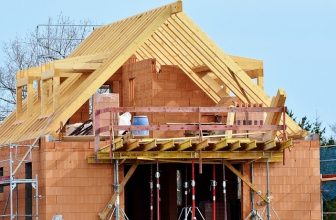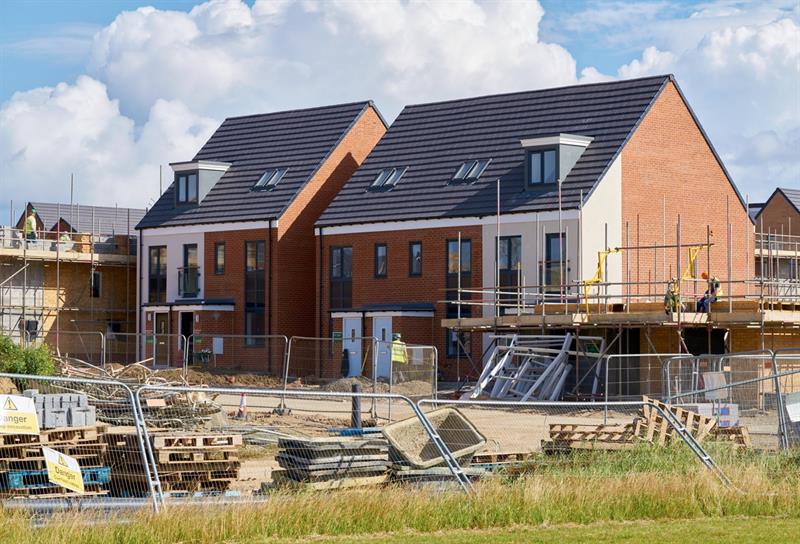Two former housing ministers have criticised the Government for scrapping housebuilding targets.
The Government officially watered-down proposals for mandatory local housebuilding targets in its flagship Levelling Up and Regeneration Bill last year. It saw off a backbench rebellion by stating that while housing targets remain, they will be advisory and are a starting point with “new flexibilities to reflect local circumstances.”
But the policy was criticised by high-profile Conservative MPs during a debate on housing supply brought by senior Tory backbencher David Davis in the House of Commons earlier this week.
Simon Clarke, who was Housing Minister between September and October 2022, said, “our society does not build the homes that we need to accommodate our existing population, and therefore we need to establish clear targets for housing supply. Doing so is not some kind of Stalinist five-year plan, it is the best way we have yet identified to prevent councils from backsliding on their responsibilities and caving in to what are often small, if noisy, pressure groups. It is my view that the regrettable decision taken by the Prime Minister last year to weaken those targets by removing their legal force was a mistake that has already had far-reaching consequences.”
He suggested an approach where a housebuilding rate is applied based on the existing occupied housing stock of an area in line with the national 300,000 target.
Kit Malthouse, who had the housing brief between July 2018 and July 2019, said, "he had a “church totaliser” on a whiteboard during his time showing where those houses were going to come from and how we were going to get there."
He suggested that the planning inspectorate should be scrapped and said there should be hard targets for local authorities while giving them “an absolute right democratically to choose where those houses should go in their area.”
Backbenchers, including Conservative MPs, also proposed Stamp Duty reforms such as downsizing reliefs to improve housing supply. Responding on behalf of the Government, current Housing Minister Rachel Maclean didn’t address the Stamp Duty issues or scrapping of targets specifically, but said, “every member has spoken about the importance of a modern, responsive and transparent planning system. I think it vital that our reformed planning system helps to bring certainty to communities and developers. That will enable them to take those positive steps towards building more housing, regenerating their local areas and supporting economic growth.”
Government blamed as new build approvals slump 10%
Official statistics from DLUHC reveal 269,000 homes were granted permission in the last year. New build planning approvals have slumped to the lowest level since 2008, official figures show.
The total in England reveals the number of new homes with planning permission fell by more than 10% to 269,000 in the year to March. Levelling Up Secretary Michael Gove relaxed planning targets for local councils last year, and this combined with environmental restrictions, are being seen as reasons why housebuilding has stalled.
There are fears that the yearly total of housebuilding could fall as low as 156,000, when the Government’s aim is to see 300,000 homes built each year, The Times reports.
The figures from the Department for Levelling Up, Housing and Communities show that in the first quarter of this year local authorities granted 75,000 approvals, down 11%t from the same time last year. A number of councils have suspended their targets ahead of a new system for new build targets.
Matthew Pennycook, the shadow housing and planning minister, said, “ministers can no longer deny the truth that their reckless decision late last year to overhaul national planning policy in the face of backbench pressure has set in train a collapse in planning consents and housebuilding that will deepen the housing crisis and hammer economic growth.”
Labour leader Sir Keir Starmer said Labour would allow building on green belt land by lifting planning restrictions in some areas.

UK housebuilding activity drops at the sharpest rate for three years
UK housebuilding activity fell at the sharpest rate for three years last month, despite growth improving across the wider construction industry.
According to the latest PMI data by S&P and CIPS, the headline construction PMI rose slightly to 51.6, up from 51.1 in April. The increase comes despite housing activity falling for the third consecutive month to 42.7, reflecting the weakening demand in the housing market. Any score below 50 is considered a decline, whereas anything above is seen as growth.
The data shows an increase in civil engineering, commercial activity and new orders to 53.9, 54.2 and 55.4, as main infrastructure projects continue to be awarded, strengthening the pipeline of work in the sector. In addition, new orders saw the strongest rise since April 2022, and civil rose to an 11-month high in May.
Kelly Boorman, partner and national head of construction at RSM UK, said, "the continued fall in housebuilding for May does not come as a surprise, and although only slight, highlights the weakening demand for housing as people are still cautious given interest rates and the cost-of-living crisis. The UK’s housing market is showing signs of distress as net mortgage lending contracted by £1.4bn in April, the lowest level on record excluding the pandemic. But, with mortgage rates set to jump even higher, coupled with house prices falling at the fastest rate since July 2009, there are further headwinds for the housing market, with housebuilders pulling back on projects to protect their margins.”
Thomas Pugh, economist at RSM UK, added, “further falls in house prices seem likely given mortgage rates are rising again and mortgage approvals, which are a leading indicator of demand in the housing market, fell again in April. But we’re not expecting a large slump in prices for three key reasons. First, to some degree higher interest rates will be partially offset by an easing in the cost-of-living crisis as inflation falls back rapidly over the rest of this year. That will allow households’ real incomes to start growing again. Second, the labour market is likely to stay tight and, even though the unemployment rate will probably rise over the rest of this year, it won’t surge. This means that there won’t be a wave of forced selling, which is normally required to generate a large fall in prices. Thirdly, as evidenced by the drop in the housebuilding component of the construction PMI, the supply of new housing is constrained. Given the chronic shortage of homes in the UK this structural imbalance is unlikely to allow large falls in prices. So, we see some further falls in prices, driven by a lack of demand rather than forced selling. Falls of around 5-10% from their peaks seem reasonable. This is unlikely to have any significant repercussions for the wider economy given the surge in prices in the previous few years.”
MPs say scrap Stamp Duty except for second and holiday homes
More than 50 MPs within the Conservative Growth Group say Stamp Duty is 'not at all Tory or British'.
More than 50 conservative MPs are calling for Stamp Duty to be scrapped amidst the continuing cost of living crisis as remnants of the Liz Truss era of politics continue to bite at Prime Minister Rishi Sunak’s heels. The Conservative Growth Group wants it scrapped for those buying a place to live and to be only paid on second or foreign homes.
Chairman Ranil Jayawardena says, "that the tax is “not at all Conservative or British. We should be making it easier for people to get on and up the property ladder… and to climb down in later life. People buy their home out of taxed income. Why double tax them?”
The same group of MPs, including former Chancellor Nadhim Zahawi, last week urged Sunak and his Chancellor Jeremy Hunt to scrap inheritance tax. The Conservative Growth Group of 55 MPs was formed by allies of former Prime Minister Liz Truss.
Writing in the Telegraph last week Zahawi suggested scrapping the tax and said it was “morally wrong” to take someone’s assets on their death. The Negotiator reported last month how Stamp Duty should be waived for downsizers and that the industry should scrap archaic terms such as ‘landlord’ and ‘tenant’ and change them to ‘property owner’ and ‘resident’.
Experts from Cambridge University Land Society (CULS) say that the affordability and quality of housing will only get better if policy makers prioritise long-term outcomes and de-prioritise politics and vested interests. Stamp Duty is paid at 5% for a property above £250,000 and at 10% over £925,000.

